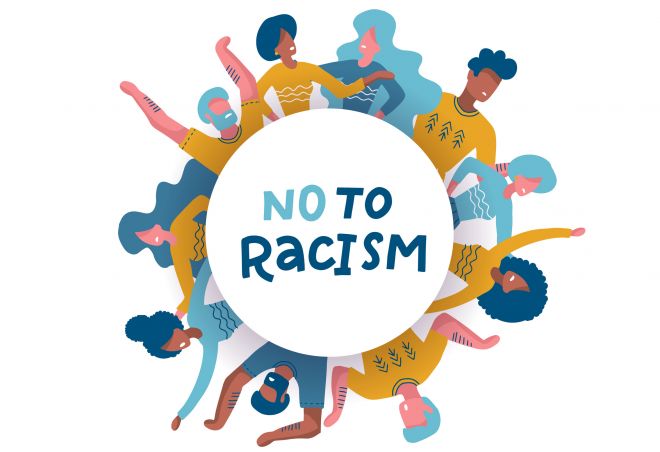Anti-Racism and Recruiting Diverse Members for a Better World and Healthier WILPF
Published on April, 43 2022
By Darien De Lu
April 2022
I urge all WILPF members – each of you! – to seek out people you can invite to join WILPF – especially people of diverse colors, cultures, ages, and backgrounds. Such a diverse membership will help us choose our issue work and actions with a broader perspective. We know how much WILPF adds to our lives, giving us a like-minded community for activism and discussion. Now, let’s extend that positive experience! WILPF is experiencing the effects of socio-economic changes that lead many people to have less time for volunteering, so it is crucial that we have a wider membership base to support our volunteer-based activities.
We would like the diversity of our branch membership to be proportional to our local populations to better reflect the concerns of our varied communities. WILPF has a strong record of working for racial justice (see my 2021 eNews series on our racial justice work in recent decades – in September, October, and December. Many branches work collaboratively with local, predominantly “BIPOC” (Black, Indigenous, and other People Of Color) organizations, yet it’s time for us to take a stronger stand. Branches and at-large members should seek out opportunities – and create initiatives – to directly interact with and participate in BIPOC-led groups.
We can all offer guidance to other WILPFers by publicizing our local initiatives – such as the very successful (over 200 registrants!) Detroit Branch program on gun violence. That online event featured a multi-ethnic and multi-racial panel and – along with a prior event – reached out to and attracted the diverse membership of collaborating social worker and teacher organizations.
We must remember how systemic racism in the U.S. has created enormous economic obstacles for BIPOC. Many of those obstacles are as specified in the book, The Color of Law by Richard Rothstein. How does racism add to the cost of being a member of a discriminated-against minority group? Can you think of at least three ways?
We should all be familiar with long-standing racist restrictions on job options and hiring, plus wage discrimination. Historically, Blacks and other minorities frequently paid higher rents for the limited housing available to them. Home and other loans are often unavailable or available only at a higher cost.
Did you think of the increased costs of health care, including chronic problems? Health issues increase due to stress from disrespectful and unfair treatment and various environmental factors for BIPOC individuals. Those range from greater pollution to lack of good grocery stores to the hazards of street crime and police!
And what about the loss of generational wealth – capital – due to all these factors? That makes for greatly restricted opportunities.
How many costs did you identify? To assist members in understanding and being aware of facets of systemic and institutionalized racism such as these, WILPF has undertaken many activities and measures over the past year. We invited members to join our national book study group on Uprooting Racism, by Paul Kivel, and branches and at-large members can contact me to get the set of study questions to conduct their own study group. Similarly, all members are encouraged to explore in groups their thoughts and responses to the videos, articles, books, and more in this WILPF Resource List for Dismantling White Supremacy (over twenty pages!). Learn from studying those resources and the items in the Advancing Human Rights Resource Library.
However, reading and study alone must be tested by practice! We’ve worked for decades to obliterate racism, yet white supremacy in U.S. society and institutions is like the toxic PFAS and PFOS chemicals in the oceans and soil of the world – present, at least in traces, throughout! So we must undertake “inner” work in WILPF. We can look critically at the functioning of our branches and at other WILPF structures to identify and confront vestiges of structural racism and unconscious bias. A committee that met throughout last summer addressed such inner work. A key outcome was recognizing the importance of WILPF members directly connecting and working with local BIPOC-led groups that share WILPF values.
Additionally, white WILPFers can specifically address racial justice with groups like Showing Up for Racial Justice (SURJ). Paul Kivel was one of the founders of SURJ, and he spoke at our August 2021 WILPF Congress. Kivel’s was one of several presentations about racism. You can view Kivel’s recording here, and you can see the entire “playlist” of Congress programs here.
As I noted above, WILPF members have allied with BIPOC groups for years, but we hadn’t necessarily considered the importance of having BIPOC voices within our branches. In national WILPF, we also want and need to have diverse leadership to better pursue racial justice. Choosing that road is useful for us all to view critically – and constructively – our functioning and practices. Sadly, I have heard from some members – white and BIPOC – that they have backed off from national leadership due to the personal, public attacks about alleged “white supremacy.” White members should understand the tendency we may have to “white fragility,” yet ad hominem attacks are destructive and hurtful. They are inconsistent with the WILPF International Code of Conduct.
WILPF and I will continue to seek ways to pursue anti-racist practices and policies. When the national Board meets in-person in Washington, DC, for the June 18 Poor People’s Campaign march, we’ll continue our long-standing practice of in-person meetings of engaging in racial justice trainings and discussions.
What are you doing with other local people and/or your branch? Have you spoken up to invite diverse community allies to join WILPF? I ask for your help to continue this work! Please share with me your experiences and questions. Contact me (President@WILPFUS.org).
WILPF has been known for our sisterhood, and now we can extend that to even more members.



